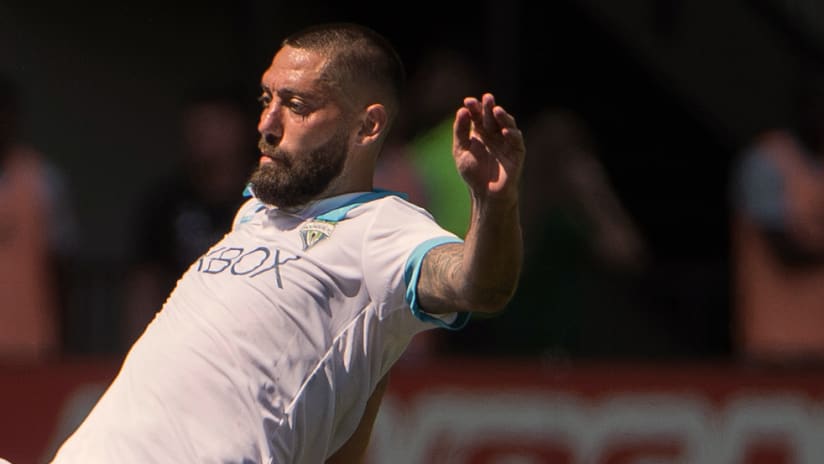After suffering a 1-0 loss to rivals Portland Timbers on Sunday, the Seattle Sounders are a far cry from the 2017 MLS Cup finalists we are all accustomed to watching.
The Sounders lined up in an atypical 5-4-1 formation heading into the match at Providence Park, one they used just once in recent memory, getting a win against Toronto FC on Wednesday. This formation, which places emphasis on defending and indicates their intention of grinding merely for a point, lacks attacking prowess. With five shots, one shot on target and one offside call they rarely threatened.
Clint Dempsey lined up in the lone striker (No. 9) position and yearned for service and support. For a No. 9, no service equals no goals.
Typically, a lone striker is asked to hold up the ball, and provide an outlet when your team is under pressure. You must stay high up the field and central, so as to stretch the defense and keep them honest. The team relies on you to be in the box, and finish your chances. For defensive purposes, your duty is to force the defenders to play the ball to one side or another, to make it predictable for the teammates behind you to read the play.
When you are the lone striker in a system where there is no support for you, it can feel as if you are stranded on an island alone, feeling disconnected from the flow of the game and from your team. You are constantly battling with at least two defenders. One in front of you and one behind you. It’s like a wrestling match. It’s common for there to be long periods of time without getting a single touch on the ball, making it easy to drift out of the game mentally. Look at the lack of support he has on the play below.
You can often find yourself coming back to check deep for the ball, just to get a touch, to get involved in the game which takes away from there being a true center forward option. So, if the ball did turnover, you are out of position and not available to capitalize. And when a teammate eventually does finds you, more often then not you have no option but to dribble because the rest of your team are deep in your own half.
Your mind starts to obsess with ways to get involved causing you to chase the game and work harder on defense to hopefully spark a counterattack or chance. When that one chance does finally come your way, often times you can be exhausted from all of the extra work, and that one chance goes to waste. It’s a mental and physical battle when you’re a lone striker with no support.
When defenders know there’s no deep threat, they can take chances and risks at denying service to your feet. It makes the game that much harder to get touches when defenders can anticipate the next pass. In Portland’s case, Liam Ridgewell and Larrys Mabiala could stay high and prevent balls in to Dempsey’s feet, knowing that they won’t get beat over the top.
Seattle can not stick with this formation and expect results, it’s not an effective way to utilize one of their best players. Obviously, they are missing many important pieces due to injury but the coach has to assemble the team correctly and be prepared for any circumstance. Realistically, Will Bruin will be back in the mix (when healthy) and in order for both forwards to be on the field simultaneously, as they need to be, to maximize chances and give Seattle a realistic shot at winning games, while keeping three center backs on the field, they will need to play a 3-5-2 formation.
This will allow Dempsey to have support and be higher up the field and have the freedom to be creative. Clint should be closest to goal, and you can bet on him, that if he has the right support, he will deliver. As he has shown time after time, throughout his lengthy decorated career.
CHARLIE DAVIES is a former US national team forward who played six seasons in MLS (D.C. United, Philadelphia Union and New England Revolution). He also starred for Sochaux (France), Hammarby (Sweden) and Randers (Denmark) in Europe. Prior to turning pro, Davies was a Hermann Trophy finalist during his collegiate career at Boston College.













